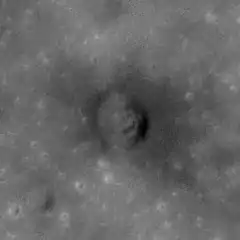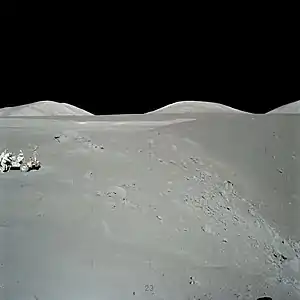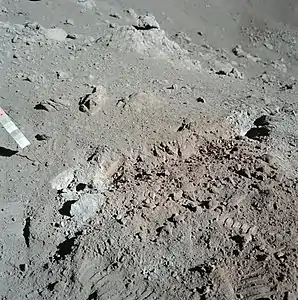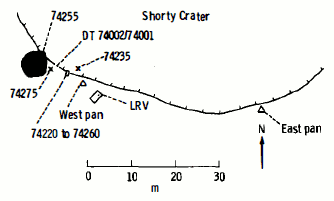Shorty (crater)
Shorty is a feature on Earth's Moon, a likely volcanic crater in the Taurus–Littrow valley.[2] Astronauts Eugene Cernan and Harrison Schmitt visited it in 1972, on the Apollo 17 mission.[2] It is the location of the famous "orange soil".[2] It is about 110 meters (120 yards) in diameter and up to 14 m (15 yd) deep.[3]
Shorty Crater is about 14 m deep. Based on our investigations at the site and later examination of photographs, the impact that formed it penetrated, in order, regolith on the avalanche deposit, the avalanche deposit, regolith on a basalt flow, a basalt flow overlying and protecting the orange and black glass layers, the orange and black glass layers, regolith on a second basalt flow, and, finally, the upper portion of that second flow. Orange and black glass clods and basalt boulders are spread throughout the ejecta blanket surrounding Shorty.
 Location of Shorty crater in Taurus-Littrow Valley. South Massif is at lower left, North Massif is at top center, and Sculptured Hills are at upper right. Scale bar is 5 km | |
| Coordinates | 20.22°N 30.63°E |
|---|---|
| Diameter | 110 m[1] |
| Depth | 14 m |
| Eponym | Astronaut-named feature |

To the east of Shorty are Victory, Camelot, and the Apollo 17 landing site. To the southeast is Brontë. To the southwest are Lara and Nansen.
The crater was named after the character "Shorty" in Richard Brautigan's 1967 novel Trout Fishing in America, as well as to honor the genre of the short story with particular reference to J. D. Salinger.[4]
 Apollo 17 panoramic camera image
Apollo 17 panoramic camera image Exploring Shorty crater during the Apollo 17 mission to the Moon. The orange soil was found to the right of the rover, at the base of the small hill at the crater rim.
Exploring Shorty crater during the Apollo 17 mission to the Moon. The orange soil was found to the right of the rover, at the base of the small hill at the crater rim. Orange soil found next to Shorty, which turned out to be titanium-rich pyroclastic glass[3]
Orange soil found next to Shorty, which turned out to be titanium-rich pyroclastic glass[3] Planimetric map of Station 4 including the rim of Shorty
Planimetric map of Station 4 including the rim of Shorty
References
- Shorty, Gazetteer of Planetary Nomenclature, International Astronomical Union (IAU) Working Group for Planetary System Nomenclature (WGPSN)
- APOD - June 24, 2012
- LROC - Just Another Crater?
- The Valley of Taurus-Littrow, Apollo 17 Lunar Surface Journal, Corrected Transcript and Commentary Copyright 1995 by Eric M. Jones
External links
| Wikimedia Commons has media related to Shorty (crater). |
